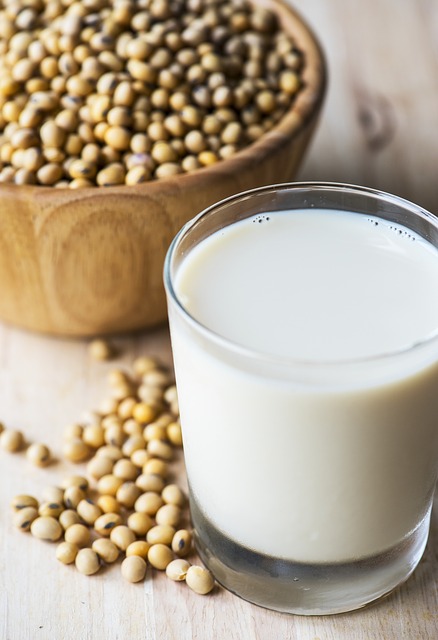Sója a její výrobky jsou ve výživě poměrně kontroverzní tématem. Jak to vidím já?

Sója se řadí mezi luštěniny. Obsahuje poměrně velké množství bílkovin, které ale neobsahují veškeré aminokyseliny. Proto je nutné kombinovat stravu s jinými rostlinnými zdroji. K úplnému složení chybí aminokyselina cystein a methionin.
Sója dále obsahuje i lipidy, které na rozdíl od živočišných tuků neobsahují cholesterol a brání vstřebávání cholesterolu ze stravy. Také se řadí mezi významné zdroje fosfolipidů.
Ze sacharidů obsahuje sacharózu, oligosacharidy, které jsou nestravitelné a způsobují nadýmání, malé množství škrobu a vysoký podíl vlákniny.
V sóje najdete hlavně vitamíny skupiny B, převážně B1, vitamín E, hořčík, vápník, fosfor, a železo. Sója obsahuje pětinásobné množství železa, než maso. Nicméně, vstřebatelnost je horší. To platí pro všechny minerály.
Jaké jsou benefity sóji?
Působí proti rakovině prsu a prostaty, snižuje riziko infarktu, chrání před trombózou a vysokým cholesterolem. Má pozitivní vliv na menopauzu.
Sója ale není pouze „bílá“. Existuje i řada věcí a látek, které vašemu zdraví prospívat nebudou. Většinu z těchto antinutrientů lze tepelnou úpravou odstranit (oligosacharidy, saponiny, puriny, goitrogenní látky, lektiny, kyselinu fytovou, antivitamíny).
Za zmínku stojí fytoestrogeny. Ty jsou několika-setkrát slabší než tělem produkované estrogeny. V těle nebudou způsobovat problémy. Naopak, u žen v menopauze se sója doporučuje.
Existuje spousta výrobků a ne všechny jsou geneticky modifikované a špatné. Některé z nich jsou přínosnější díky fermentaci, například tempeh.
Sóju tedy rozhodně nezatracuji, ale ani nevyzdvihuji.
Nejdůležitější je přemýšlet nad tím, jak často sójové výrobky konzumujete a zároveň poslouchat své tělo, jestli mu sója dělá dobře, či ne.
Soyabeans and its products are quite controversial topic. What is my opinion on it?
Soya belongs to pulses. It contains quite a lot of proteins, which do not incorporate all amino-acids. It has to be combined with another plant proteins to create complete spectrum of amino-acids. Cysteine and methionine is missing.
Soyabeans contains lipids, that do not have cholesterol inside. This is the difference from animal proteins. What is more, soya prevents from absorption of cholesterol from the food. It is great source of phospholipids.
From sugars, most common is sucrose, oligosaccharoze, that are not digestible and can create gas in intestine, small amount of starch and hight amount of fibre.
From vitamins and minerals, there are mostly vitamins of B complex, especially B1, then vitamin E, magnesium, calcium, phosphorus and iron. There is 5x more iron in soyabeans than in the meat, but absorbability is lower.
What are benefits of soya?
It fights against breast cancer and prostate cancer, lowers risk of infarct, prevents agains trombosis and high cholesterol. It has good effect for menopause.
But it is always „ white and black“ too. There exist some things with soya, that will not be beneficial for your health. Most of these antinutrients, we can remove by heat (oligosaccharide, saponine, purine,goitrogenes, lectines, phytic acid, antivitamins.)
One of them are phytoestrogenes, which quite a lot disrupt balance of estrogene hormonal system. Phytoestrogenes are bined to your nature receptors and it causes disbalance between hormones estrogene and progesterone and it can result in loss of mestruation. One glass of soya milk every day can cause this issue. But on contrary it is suitable for women in menopause.
There is hormonal disbalance with men too, because in presence of higher amount of estrogen, there is lower amount of testosteron. Lower amount of testosteron in man’s body causes another problems. For example higher storing of fat or unhealthy progress of reproductive system with boys.
There exist a lot of products that are not GMO and bad for you. Some of them are fermented and more valuable for you (e.g. tempeh).
Soya is not good or bad, I think, that most important is just evaluate, what is benefial for you and your body and what is more, how often you eat soya products.
